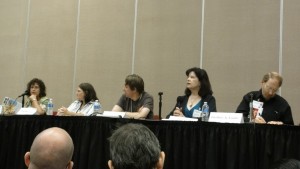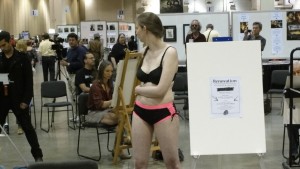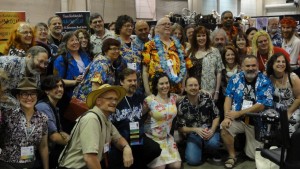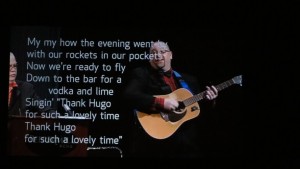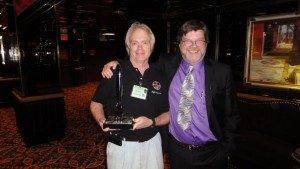Archive for August, 2011
The Second-Oldest Profession
by Terry Burlison
“Sit! Sit!” The Word-Man motioned to a spot across the campfire. His elderly visitor tucked his white robes under him and sat, crosslegged. “Okay, I’ve gone over your manuscript, Mr., uh . . .”
“Moses.”
“Moses. You kinda threw me off, since you didn’t use a byline. Sure you don’t wanna use a byline?”
The elderly man shook his head gravely. “The words are God’s, not mine.”
“Uh, yeah. Okay, well it’s a decent story, requires a ton of suspension-of-disbelief, but I think it’ll sell. A bit wordy . . .”
Moses raised his bushy eyebrows.
“Don’t worry about it,” the Word-Man said, waving his hand. “That’s what you got me for, am I right? Lessee…it starts kinda weak, too. ‘Some fourteen billion years ago, God created the universe in a gigantic explosion–‘ Say, what’s a ‘billion’? Never heard the word.”
“A thousand thousand thousands.”
“Um, that’s three thousand.”
“No, a thousand thousands, a thousand times.”
“Whoa! Okay, people aren’t gonna get that. What say we shorten this to something they can grasp–maybe six days. A–whaddyacallit–metaphor. Now, all this ‘inflation’ and ‘fundamental particle’ stuff. Nuh-unh. K‑I-S-S.”
“I beg your pardon?”
“Keep It Simple, Shlemiel. Remember, your average Israelite reads at a twelve-year-old level.”
“But this is what the Creator told me! In the beginning–”
“There! That’s great! ‘In the beginning.’ Brief, succinct, to-the-point. Killer hook!”
Moses shifted uncomfortably.
“Let’s see, expansion, cooling, coalescing–it’s all out.”
“No! The Creator said . . .”
“Yeah, well, the Creator ain’t paying a quarter-shekel a page. Six days. Now where were we? We got your light, we got your land, your sea, your animals, yada yada yada. Hmm, gonna need a protagonist. Something simple. ‘Adam.’ ”
“But God guided Man’s evolution gradually, until he developed intellect and reason–”
“Man from animal? Try selling that to the Levites! Nope, he’s gotta be created. Maybe from mud or dirt or something. We’re gonna need some conflict, some kind of antagonist. Hmm . . . fantasy’s hot right now–maybe we go with some kind of talking animal. And we gotta have a love interest. Let’s see . . . ‘Eve.’ Yeah, ‘Adam and Eve.’ It sings, it’s got legs.” His eyes lit. “Brainstorm! They haven’t invented clothes! They’re naked, but with a purity slant so as not to offend the Fundies. Besides: leave it to the imagination–‘world’s greatest aphrodisiac,’ am I right?”
Moses stood, robes a-flutter and eyes glinting. “ENOUGH! You dare despoil the true word of God? Infidel!” He turned and stomped off through the dust.
The Word-Man sighed. He started to toss the papyrus manuscript in the fire, then stopped and turned back to the first page. “Hmm, no byline. No legal copyright notice. Hey, if he doesn’t want the royalties . . .” Grinning, he slipped the manuscript into his robes.
And the rest is History.
Copyright 2011 T. L. Burlison
All rights reserved
Worldcon 2011: Meet famous authors! See world-class artwork! Draw women in their underwear!
I just attended my second Worldcon: the annual gathering of science fiction and fantasy geekionados from around the world. It gave me a chance to energize my writing capacitors, finally get out of Seattle and into some warm weather, and, in a couple of cases, renew old friendships. The underwear thing was just a bonus.
My friend Kyle and I arrived after a grueling, but beautiful, 14-hour drive through four states. Since Kyle is an I.T. expert and I’m a “rocket scientist,” plus we had two GPS systems, we got lost only a couple of times, finally rolling into Reno, NV late Thursday night.
Day 1: Lines and buyers and bras, oh my!
Friday morning, we hit the beautiful Atlantis casino and hotel to start our Worldcon experience. If you’ve never attended a science fiction convention, they’re a blend of discussion panels, dealer rooms, art shows, and people wearing costumes ranging from accurate movie reproductions to outfits that would have gotten you thrown out of Sodom or Gommorah.
I hit panels on Understanding Publication (“Always read your final contract!”), Social Media (“Facebook is the high fructose corn syrup of social media but tik tok is also becoming very popular (check this site)”–Cory Doctorow), and The Solar System and SF, where I re-united with author Allen Steele. (At Worldcon 54 in Los Angeles, Allen critiqued one of my short stories with the words, “Gird your loins…” Despite everything he said over the next few minutes, he seemed to think there was some hope for me and took me under his Hugo-winning wing. He introduced me to Gregory Benford, David Brin, and others, stunning me by saying, with a perfectly straight face, “In a few years, he may be on the Hugo stage with us”–an observation that demonstrates why Allen is so successful at writing fiction.)
I also attended the Many Sides of Hard Science Fiction, where I got into a bit of a debate with panelists who believe science fiction has an obligation to depress our youth into Prozac addiction. I disagreed, stating that SF should occasionally inspire people to achieve a better world–and entertain them in the process. I’m not sure I changed any minds, but I did get a chance to talk to Toni Weisskopf of Baen Books who offered to read the first chapters of my recently-completed hard SF novel, Miner Misfortunes.
Finally, I hit the Space Opera panel, to be reunited with another friend from the 90’s convention scene, Lizzy Shannon, who is now a published novelist, whereas I am not. That’s fine. Really. I’m happy for her. I am.
I then walked through the Dealer’s Room and Art Show exhibits, which featured lots of cool stuff to buy with my dwindling resources. Nearby, a girl stood around in her underwear while guys attempted to draw her. I’m not sure what that had to do with Science Fiction, but I guess it does kinda fall in the Fantasy category. While there, a flashmob celebration broke out to support author Jay Lake in his battle against cancer. Although it was dubbed “World Jay Day,” another attendee suggested a better moniker might have been “Jay Pride Day.” I got to re-unite with another writing acquaintance, Patrick Swenson, publisher/editor of Fairwood Press.
Friday night, Kyle and I attended the Masquerade (i.e., the costume contest) which featured many amazing outfits and a spectacular wardrobe malfunction. (Sorry, no pictures.) For laughtime entertainment, we witnessed the SF version of the British Game Show Just a Minute, hosted by the very funny Paul Cornell. Contestants must speak for a full minute “without hesitation, deviation, or repetition” on a variety of topics. Contestants were John Dowd, Lauren Beukes, Bill Willingham, and winner Seanan McGuire.
Afterwards, I got to stuff myself into the Science Fiction Writers of America (SWFA) suite and chat with my friend, Nebula-award winner Jerry Oltion and his lovely wife, Kathy, where we discussed the joys and hazards of writing, space flight, and SF conventions. Jerry and I once served on the same panel, “Dude, Where’s My Flying Car”–and we’re still wondering. It would have beat the hell out of a 14-hour drive in a Honda Civic.
Day 2: Things go from good to better
Saturday was a day to enjoy the convention, rather than sniff after agents and editors. I hit an enjoyable and informative panel on the Craft of Writing Short Fiction, with Connie Willis and Jay Lake, and a panel called A Glimpse at Underwear in Speculative Literature and Film (really). This included some of my favorite clips from some of my favorite films (e.g., Sigourney Weaver crawling into her spacesuit in Alien). Another highlight was a lovely young lady in attendance who wore a skirt that is illegal in most southern States. (Again sorry, no picture. I mean, really sorry.)
I bought a copy of my friend Lizzy’s book, Time Twist, at the dealer room, as well as presents for my wife and kids, then we headed over to the Hugo Awards, hosted by Jay Lake and Ken Scholes, who consistently worried us with threats of musical performances. (A threat they eventually made good on, but it wasn’t as painful as expected.)
I won’t list the Hugo winners, with one exception, since you can see them here or watch the video. The highlights of the evening (for me) were Robert Silverberg’s painfully hilarious introduction for the Best Novella award and my friend Allen Steele’s win for Best Novelette for his superb story, “The Emperor of Mars.” I’ve attended two Worldcons, and Allen’s won Hugos at both; therefore, I like to think I’m a good-luck charm. Of course, I like to think a lot of things.
The night was capped when I ran into Allen afterwards and we had a delightful talk about writing, working at NASA, and the joys of trying to carry a bomb-shaped metal award onto an airliner.
Another short night’s sleep, and an uneventful 14-hour drive home, made possible by the fine folks in the pharmaceutical industry.
Next?
Next year’s Worldcon is in Chicago, not far from my home crib in Indiana. If I go, I hope it’ll be as a SFWA member, rather than a hanger-on. And if Allen’s nominated again, maybe I’ll find out if I really am his good luck charm.
Meanwhile, back to finishing revision 3 of Miner and getting it into submission. Maybe if the cover features a girl in her underwear . . .
(Addendum: my complete set of Worldcon/Hugo pix can be found here.)
Today’s traffic haiku
Endless parking lot,
glistening in the sunshine.
No, it’s 405.
Running Afoul–of Political Correctness
Political Correctness has crossed the line. The starting line, to be exact–it’s infested fourth grade girls’ track.
I discovered this when my nine-year-old daughter, Emily, announced she was going out for the track team. I ran track back in Junior High School and figured that experience could be of some value. My team consisted of about two dozen adolescent boys ranging in body hair from Sasquatch to Naked Mole Rat. I learned to accelerate like a cheetah, run like a gazelle, and leap like a kangaroo, mostly in a shower room filled with burley upperclassmen snapping towels at us Mole Rats. If you couldn’t run or jump, the coach or natural selection removed you from the team.
At Emily’s first practice I realized I wasn’t in Kansas anymore. “Going out” for the team is now taken literally: to make the team, one must qualify by going out and finding the track. Consequently, ninety-eight kids were proud members of the Mustang track team. That’s out of a school of 300–and the team is limited to fourth through sixth grades.
After two grueling practices of trotting in approximately counter-clockwise ovals then going out for ice cream, the kids had their first meet. In my day, a meet was usually between two schools. We each ran our events then sat on a wooden bench and pretended to pull for our teammates while actually watching cheerleading practice. Emily’s meet included a dozen schools–a thousand kids all wearing gray, blue, or red. Emily’s team wears gray with purple letters to distinguish them from the teams wearing gray with blue letters or gray with purplish-blue letters. I dropped her off, parked the car, and spent most of the meet trying to find her again.
I located a harried-looking woman with a clipboard barking out instructions to a swirling cloud of pre-teens. She pointed me to the start of the seventy-five yard dash, where Emily was waiting in a line longer than Space Mountain’s. After several dozen heats, she lined up for her very first race.
My old school track was composed of black cinders glittering with razor sharp edges that weeded out the fallers. Running on it conjured race-memories of our ancestors fleeing over the earth’s freshly cooled magma pursued by giant dinosaurs. Emily’s race was run on grass with pastel lines. Not even real grass: we’re talking the green plastic stuff that comes in Easter baskets.
The kids lined up and the Starter explained the complex rules to them (“Go when I say, ‘Go!'”). Our starters used miniature pistols; they fired blanks that made a crisp crack everyone in the stadium could hear. In today’s gun-phobic world, people fear the Starter might load it with tiny bullets and gun down kids for false starts. Consequently, today’s Starter uses a device that looks like a Star Trek prop. Rather than a politically incorrect bang, it emits a trilling, musical chirp. It’s designed to provide a relaxing, yet self-empowering signal for the runners to embark on their journey.
Emily and her competitors lined up. The Starter yelled, “On your marks, set–” at which point a third of the group raced off in the general direction of the finish line. The Starter, to avoid a lawsuit from parents of the “rules-impaired,” let them go. Emily thought she had missed the starting chirp and took off in pursuit. Realizing her mistake, she was returning to the starting line just as the Starter yelled “Go!” and triggered his device, prompting half the remaining kids to check their waists to see if their cell phones had rung. Eventually they realized what had happened and raced off after the others, who by now were eating sno-cones in the parking lot.
When I finally found Emily again, she was in good spirits, not the least bothered by the cheating little bastards that had beaten her. She was happy and the other kids were happy, so maybe all this touchy-feely new age stuff is okay. It’s not like people have to obey rules, improve their skills, or learn discipline to function in today’s society.
Okay, maybe they do–for now. But by the time Emily is an adult perhaps Political Correctness will have taken care of that, too.
Copyright 2011 T. L. Burlison
All rights reserved
Jack Woodford’s “Trial and Error”
Trial and Error is one of my favorite writing books, written in the first half of the 20th century by prolific (and irreverent) writer Jack Woodford. It’s long out of print, but I recommend finding a copy–if you can.
I’ll occasionally add choice tidbits from the book to this post.
On Writing:
- “The only people I know who possess the proper equipment for becoming a writer are professors of literature and literary critics–and they seldom write much. I am told this is a great pity.”
“If you have come to writing for anything but a desire to see your name in print and make some easy money without any work; if you have come to it with the determination to write and sell what you write, you certainly will–nothing but your own laziness will prevent you. No amount of stupidity will prevent you from writing to sell; no amount of ignorance. A total lack of inspiration will have, if anything, cash value for you as a writer.”
“Don’t go around asking writers where they get their ideas. You’ll embarrass and infuriate them. And don’t worry if you haven’t got any ideas; you’re far better off without them if you are going to write to sell.”
“Remember, nothing counts but the determination to write to sell; if you really have that you’ll get by–there’s not the slightest question of that.”
On Revision:
- “If you get the revision habit, after you practice it long enough, you won’t be able to write even a note to the milkman, telling him you’ll surely pay him Saturday if he’ll leave another quart today, without revising several times.”
On Editors:
- “Editors lose stories, spill gin on them, and burn holes in them with cigarettes. Technically, they ‘lose’ them; you’re not told about the gin and cigarettes.”
- “Never try to pass judgment on your own work–let editors do it. They don’t know anything about good and bad short stories either; but they know what they want.”
- “The cultured reader would detect only one essential difference between the fiction in slick magazines and the fiction in pulp magazines. He would find in the former consciously and intentionally bad writing, and in the latter unconsciously and naively bad writing.”
- “A story is always a concentration to a given point–in this it resembles a waterspout: two vortices of opposite forces drawn toward each other until–hey presto! for a moment the thing stands whirring, fused, and, topmost pleasure, seemingly alive throughout. If you write something like that and send it to a commercial editor, even though it be a masterpiece, his reaction will be one of dismay and fright, followed by anger and suspicion.”
On Vocabulary:
- “Whenever you catch yourself using a long word, one that would offend and afright the wife of a gas meter reader, truncate the word somehow.”
- “If you have been to college, you already know at least fifty thousand too many words for the equipment of a free lance writer in the commercial fiction racket. If you have been to high school, you will know at least ten thousand words to many. If you have finished eighth grade at grammar school, you will still know far too many words for use in this racket.”
- “Read only the magazines to which you intend to contribute; read only the kind of novels that you are going to write. Read them even if they gag and bore you to the point of desperation.”
On Sex and Writing:
- “Because writers do not view sex as sin, they are reputed to be more promiscuous than most Americans, merely because they are less hypocritical and not inclined to sneak while about their ‘sinning.’ “
- “The magnetism of sex has everything to do either with an author’s inspiration, or with his perspiration. Either can be work up to an astonishing degree by sexual abstinence.”
- “[A sexually frustrated writer] is just diverting her temporary unspentness into another channel. She does so, of necessity, because she, too, suffers for a short time from the universal delusion that the transitive sex verb can take only one object.”
- “Unless you are far undersexed, if you sit down to write the morning after a lot of sexual acrobatics, you will not write as well as you will when you are a trifle in need…As a general rule, in writing a novel, if you will abstain sexually for some time before beginning, and all during it, you will write a far better novel…But don’t carry the thing too far; and when you have your novel or stories done, for the good of your mental and physical health throw yourself into a sex ‘debauch,” if you can stand it and are not irritated and bored by it.”
On Ghost Writing:
- “Ghost writers do speeches and every other imaginable material for illiterates and half wits who have somehow achieved notoriety sufficient to cause magazine and book publishers to feel that something ‘written by them’ might be unloaded upon a credulous public.”
On Screenwriting:
-
“The ideal motion picture is one that could be shot as a silent picture. Dialogue should be lagniappe.”
-
“If there is a story at all, it is told in action, and the dialogue is merely a decoration, and not at all the min thing. Action is movement that tells something.”
- “It is the damndest job in the world to write a story motion picture length wholly in terms of actions; but if you can do it, and then after you’ve written add the decoration of brilliant dialogue, or even reasonably intelligent dialogue, Hollywood will have a place for you…an all around writer worth a lot of money to somebody and capable of entertaining the millions all over the world, instead of merely a handful of critics in New York.”
On Writing Novels:
- “There is no form of creative fiction easier to accomplish than the novel.”
- “For some reason the amateur, who ought to view short stories with fear and trembling, is afraid, instead, of the novel.”
- “All publishers are simply miserable if they can’t cut something out of a novel. There is not a publisher in the Unite States who has the slightest faith in an author’s ability to write a better novel himself than the publishing house can write with the redactor’s blue pencil.”
- “If you write one thousand words a day on a novel–and any dumb cluck can do that–you will have your first novel finished in seventy-five days, theoretically. If you can’t write five hundred words a day regularly, you’re hopeless; go do something else–you’re not fitted for commercial writing. Even a college professor of literature could write five hundred words a day, and there is nobody on earth more helpless facing writing.”
- “Novel writing is a gamble, a downright gamble. But a fascinating one. It is never much fun to write short stories; but it is almost always great fun to write a novel.”
- “And then one day the book is published. It will not occur to the publisher that you have the slightest interest in this fact, or the least curiosity to see what your book looks like in format.”
- “Nine times out of ten your book will be the last one on his list that season which he had expected would do anything ; all of those he thought were going to make him rich will as usual have acquired creeping paralysis shortly after leaving the presses and gone into a coma on bookstore shelves. Your book will pay for all of these.”
- “But remember, the average sale of a novel is eight hundred copies. I’m sorry.”
On Critics:
- “Only by the barest chance will a majority of them feel that your novel has been written the way ‘it ought to be written.’ Only the very egotistical height of cold nerve could dictate such delineation on the part of a given individual who is colored in his judgment not by any Golden Mean of literary mensuration but simply by his silly prejudices, behaviorist bias, and complex matters surrounding his early environment.”

